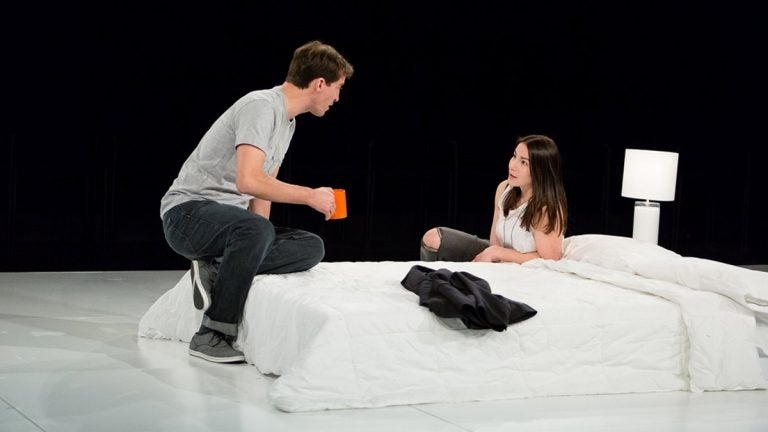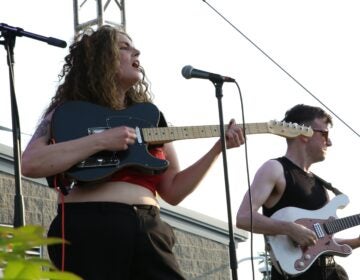Review: ‘The Hard Problem?’ For Wilma Theater, no difficulty

Ross Beschler and Sarah Gliko in Wilma Theater's production of 'The Hard Problem.' (Photo courtesy of Alexander Iziliaev)
It’s been a heady week for the Wilma Theater. First, its co-founder and artistic director Blanka Zizka announced a $10 million campaign to re-do the Wilma’s façade and lobby, and to establish a company of theater artists who develop work and shepherd it to the stage. Then, on Wednesday and under Zizka’s stage direction, the Wilma opened the North American premiere of the latest work by a man who is arguably the greatest living playwright in our language.
Both events went well. No, let me reword that. The announcement went well. The play – “The Hard Problem,” by Tom Stoppard – went into orbit. It is nothing less than you would expect from Stoppard at his best: an intellectual barrage of ideas and arguments surrounding them, in this case tied together by a plot that seems incidental but ends up masterfully illustrating the concepts.
“The Hard Problem” is named for a phrase coined by Australian psychologist David Chalmers, who’s now teaching at New York University. It’s about consciousness. How do we develop it, and what neurological forces – if any – bring it about? Could some scientific equation explain the way we appropriate our experiences to make judgments, perceive opportunities, react to situations? Can computers ever duplicate or even imitate that?
And on what basis do we form judgments, given our individual consciousness? Am I a selfless, nice guy when I bring you a cup of coffee at your desk, or do I want something I can’t even yet perceive but know is possible?
The hard problem comes because the concept of consciousness cannot be explained scientifically. (Or transferred to our devices. The play makes several references to whether a thermostat could ever have a conscience or be conscious.)
Some will find “The Hard Problem” a hard problem — a heavy-duty mind trip of nearly two hours without intermission. But I’ll bet for many people the play will be a tonic, composed of Stoppard’s mix of research, bang-bang dialogue, arguments that force you onto sides, a plot that reveals itself subtly, high-toned word play and simple gall. I found myself being joyfully battered by it, trying to follow the different arguments Stoppard draws from psychology, brain science and everyday observation. He presents a piece of information and – zip! – it’s transformed into someone’s perspective and – zip! – it’s countered or enlarged by another piece of information, then another perspective. This play about the nature of consciousness forces you to be aware that you are keenly conscious of what’s coming at you from the stage.
There’s no problem in defining why “The Hard Problem” at the Wilma is a stunning success. It’s a mix of Stoppard’s words and Zizka’s decisions about how to make them come across. You know you’re crawling around in Stoppard’s mind from the opening scene, when a doctoral student in psychology and her slightly smug tutor (Sarah Gliko and Ross Beschler, both outstanding) spar over ethereal notions and you feel like a voyeur watching young folks flexing intellectual sinews. She’s an aspiring researcher who, we learn, has long ago given up a baby for adoption, “as if I swapped her for a doctorate.” She’s haunted by her decision and believes that God figures into a universe of enormous complexity. He’s a tutor who hits on the women he serves, or — in his telling — they go after him. He believes that spirituality is based on the unprovable and is senseless, and that ego drives decisions, not altruism. The two, from opposite mental polarities, are having a fling.
They remain friends as they go their ways – she to a company called the Krohl Institute for Brain Science (Steven Rishard plays the self-important but decent Krohl), he to university teaching. They have a host of mutual friends: the Krohl Institute’s pilates instructor (Taysha Canales) who’s involved with a know-it-all neuro-scientist (Shravan Amin), and others are played with fine-tuned motivation by Krista Apple-Hodge, Jeena Yi, Lindsay Smiling and Gaby Bradbury.
They all have their professionalism — and their quirks, which take root here and influence the plot. “The Hard Problem” is particularly muscular because Zizka invests it with rigorous stage detail. She carefully moves the characters and the plot through Matt Saunders’ jolting all-white set with a split audience looking down from either long side of the stage, as if we’re watching some sort of antiseptic laboratory. Zizka uses Thom Weaver’s lighting to conjure many moods, or to gradually transform them.
Most galvanizing, she uses the impeccable saxophonist Michael Pedicin between scenes and sometimes sitting to the side, and the soulful music he plays by Daniel Perelstein tells us we’re chasing something just out of our reach. Pedicin is no fiddler on the roof, representing fate and change. He’s a saxophonist on the set, telegraphing uncertainty.
Like Zizka and her late husband Jiri, who together formed the Wilma, Stoppard is a native of what is now the Czech Republic, and that tie seems to provide the answer to the Wilma’s long-time relationship with him. But there’s much more than that. Stoppard said when he introduced Zizka at the announcement of the Wilma’s new ventures Monday that he, she and the Wilma organization hold the same sensibility about theater: that more than an entertainment, it’s a place for off-center investigation through “an eclectic choice of plays, some of which are commercially dangerous.”
That means risk-taking, the sort that has made Stoppard’s challenging work a mainstay in Philadelphia because of his relationship with the Wilma, with about a dozen Stoppard productions including “Arcadia,” which opened the theater’s building in 1997. The Wilma folks, in their press materials, call themselves the nation’s foremost interpreters of Stoppard’s work. “The Hard Problem” makes you see why they’re allowed.
“The Hard Problem” runs through Feb. 6 at Wilma Theater, Broad Street between Locust and Spruce Streets. 215-546-7824 or wilmatheater.org.
WHYY is your source for fact-based, in-depth journalism and information. As a nonprofit organization, we rely on financial support from readers like you. Please give today.




